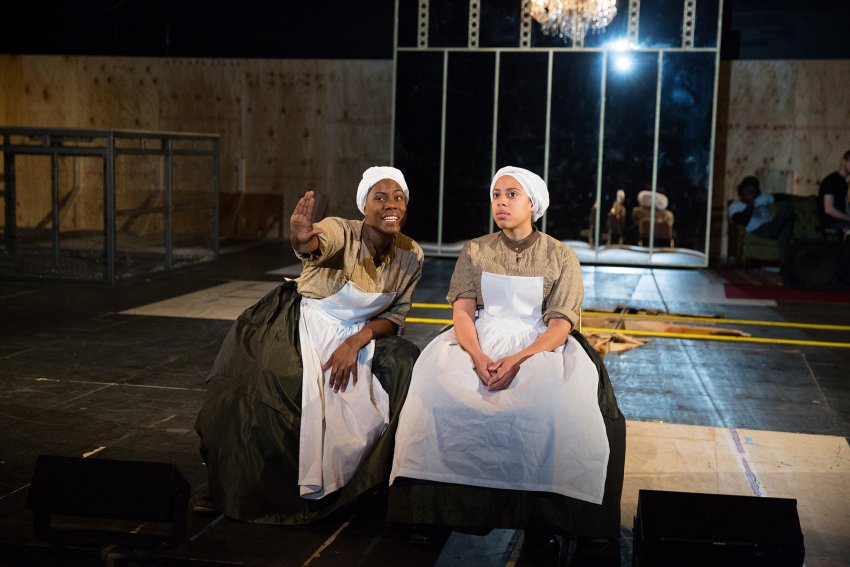Excerpted by kind permission from Neals Paper

Beyond being entertaining and thought-provoking, Branden Jacobs-Jenkins’s AN OCTOROON is an experience—one made more exhilarating by Joanna Setlle’s variegated, perceptive production, a landmark performance by James Ijames, and witty turn by Campbell O’Hare.
AN OCTOROON preserves enough of a successful a Civil War era melodrama, Dion Boucicault’s The Octoroon, to show that play’s viability yet outdatedness. Meanwhile, it deconstructs it in a fierce but respectfully intelligent way to reveal how racist attitudes that predate Boucicault flower today.
A playwright named BJJ (one of Ijames three roles) promises not to deconstruct Boucicault’s opus even as he explains why the 1859 Octoroon is difficult to perform today because no white actor will agree to play characters who are so blatantly racist. Boucicault (Ed Swidey) appears to mocking berate the audience for not remembering him or this popular play. Boucicault’s rantings and BJJ’s dilemmas inform what’s to come: a staging of The Octoroon as part of AN OCTOROON—a grand pageant that entertains on the melodramatic level while stunning with the comic literary commentary.
BJJ overcomes his casting difficulties by casting himself as the white characters. Ijames, clad in a white wife-beater, tighty whiteys, and white-face greasepaint, plays the inheritor of a highly mortgaged antebellum Louisiana plantation and also a scoundrel who longs to foreclose and claim Zoe (O’Hare), the “octoroon”, as his slave.
As Ijames—who is black—dons his white face, Ed Swidey—who is white—smears his pasty, bearded cheeks with mercurochrome red paint to play a Native American character, while Justin Jain—who is Asian—gets out his grease stick and turns into a pair of stereotypical black slaves. Marvelous young actor Aaron Bell adds to the masquerade by putting a giant rabbit head (Tilly Grimes’s costumes are a joy and wonder throughout) to play Br’er Rabbit (a figure from Southern folk tales that Jacobs-Jenkins and Settle use as both a symbol and for comic commentary) and by slicking back his hair to play a dapper Cajun paddle boat owner.
With these guises, we see how one man plays many parts, in his own life and on the theatrical stage. How silly that people of one pigment could lay a judgment of inequality or inferiority upon people of another pigment! Boucicault is not quite an abolitionist, but he comments this silliness with attacks on the inhumanity of “the peculiar institution”. Yet Zoe becomes sympathetic in Boucicault play because she is only one-eight black and regarded as the daughter of the estate and full member of the “master’s” family.
In Jacobs-Jenkins’s hands, this “silliness” is pointed up as ridiculous and absurd, yet a way of the world. Boucicault, in melodrama, lets you feel the heartbreak of one slave, without including all slaves. Jacobs-Jenkins, in parody, lampoons history and its repercussions. He shows how what is common in one age looks unconscionable in another and how the past has parallels today.
One clever way he does this is via the talk between three archetypal slaves. Dido (played so wittily by Taysha Canales), Minnie (given humorous treatment by Jaylene Clark Owens), and Grace (played with edge by Alina John) complain and grouse in contemporary ways. Jacobs-Jenkins has them idly gossip about who is doing what on the plantation, as people would over any fence, or any street corner, and in any mall parking lot. Slavery is the women’s life, and they talk about as such.
Thom Weaver’s lighting is various and often evocative, serving at times like an extra character. Music by Ill Doots is rhythmic but is usually too highly miked for lyrics, which range from sharp to simplistic and comme il faut, to be easily heard. Avo Jansen Jackson deserves kudos for her choreography.
AN OCTOROON is not without flaws. Jacobs-Jenkins is intentionally, and hilariously, self-conscious, but this veers to gratuitous and ostentatious, as if the youthful author is riffing for his own amusement or vanity and couldn’t control his wit or passion. A couple of these instances—which occur mostly while the author is parodying Boucicault’s melodrama—might fly in some productions, but Settle is so adroit as keeping all arch, subtle, and satiric that such lapses call attention to themselves.
But Jacobs-Jenkins is the Major League brain who writes for the theater and makes the theatrical his metier. Settle reinforces the rampant, exuberant theatricality of AN OCTOROON so the Wilma production is as impressive and as laudable at Jacobs-Jenkins’s remarkable, exciting play. Read the full review on Neals Paper >>>
[Wilma Theater, 265 S. Broad Street] March 16-April 10, 2016; wilmatheater.org.
“An Octoroon” runs though Sunday, April 10 at the Wilma Theater, Broad and Spruce Streets, in Philadelphia. Showtimes are 6:30 p.m. Tuesday, 7:30 Wednesday, Thursday, and Sunday, April 3, and 2 p.m. Saturday, Sunday, and Wednesday, April 6. Tickets, thanks to a generous grant from The Wyncote Foundation, are $25 and can be obtained by calling 215-546-7824 or by visiting www.wilmatheater.org.
